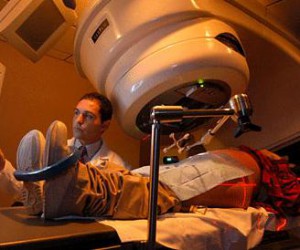
If you’ve been diagnosed with prostate cancer and determine that immediate treatment is best for you, your next step is deciding which form of treatment to have.
There are two standard ways to treat prostate cancer that has not spread beyond the prostate gland:
• Surgery to remove the prostate gland which is called radical prostatectomy.
• Radiation therapy sometimes combined with androgen deprivation therapy, which shuts off male hormones that fuel cancer cells

But men with very large tumors or tumors very close to the nerves may not be able to have this surgery. Radiation therapy can also cause impotence and urinary incontinence, but whether these occur at equal or lesser frequency than for surgery remains unknown.
Rates of these side effects can vary based on the expertise of the surgeon or radiologist. “Treatment specialists should be able to tell you their rate of side effects in their particular patient population,” says oncologist and director of adult urology at a leading Hospital in United States.
If a man has good erectile function and is sexually active before treatment, doctor says, he should expect to enjoy those functions after surgery or radiation with about 80 percent confidence. Continence should be 95 percent or higher in those without any history of bladder control problems.
Determining whether to opt for surgery or radiation is largely a matter of a man’s personal preference. Surgery involves, well, surgery, which some patients prefer not to have. Others may prefer the one-shot removal of their tumor offered by surgery as opposed to weeks of radiation treatments. Those with an early cancer that is growing rapidly might do best with multiple treatment regimens such as surgery followed by radiation along with androgen deprivation therapy.
“With treatment, I don’t think we know anything more now than we did five or 10 years ago about which way to go in terms of surgery or radiation,” says director of the Oncology at a leading Cancer Institute.That’s because of a dearth of clinical trials comparing the two approaches to see which is more effective at preventing the spread of prostate cancer.

Some surgeons could also perform a laparoscopic prostatectomy, which involves making mid-size cuts about a half inch each in the abdomen in which tiny cameras and surgical tools are inserted to remove cancerous tissue.
Androgen deprivation therapy may also be recommended along with radiation treatment if a patient doesn’t respond well enough to the radiation treatment alone. Doctors can gauge how well patients are responding to radiation by measuring a blood biomarker called prostate specific antigen or PSA. Men who undergo hormone therapy typically experience hot flashes, low libido, weak bones and possibly diarrhea and nausea.
Which surgery a patient is offered often depends on what surgeons feel comfortable performing based on their own experience. “The likelihood of curing your cancer and having as few post-surgery complications as possible depends on the skill and experience of the surgeon, not whether the surgery is done open or with a robot.
To know more about Prostate Treatment in India please visit this link : https://safemedtrip.com/medical-services/cancer-treatment-in-india/prostate-cancer-treatment-in-india.html

 Click to WhatsApp
Click to WhatsApp +91-9899993637
+91-9899993637



